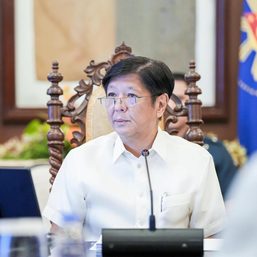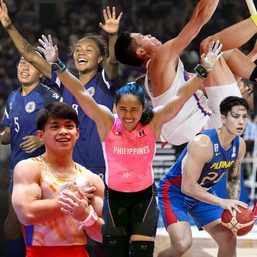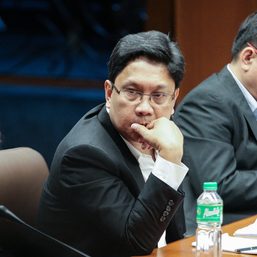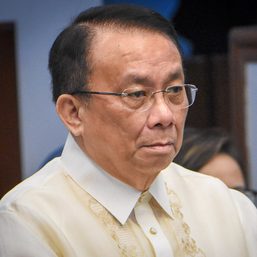SUMMARY
This is AI generated summarization, which may have errors. For context, always refer to the full article.
![[ANALYSIS] 100 days with Marcos: All smoke and mirrors?](https://www.rappler.com/tachyon/2022/10/TL-Marcos-100-days-October-7-2022.jpg)
Whatever we say about President Ferdinand Marcos Jr. a hundred days into his presidency, the sad truth is, we don’t know much about him.
We could string together anecdotes from what we’ve seen on social media, what’s been whispered to us, or what Toni Gonzaga is gushing about. But what could we make out of them? That he’s a nice chap, wants only unity, is conflict-averse?
We could count the many times he’s cut a ribbon, karaoked at a party, flown over disaster areas (and to car races), attended official meetings in crisp barong and dapper suits, or stood beside his first lady. But what could we make out of them? That he works hard and plays hard as well?
To be sure, Marcos is head of a government that’s been ransacked in the last six years – where patrons ruled, incompetents thrived, merit was sidelined, and sloppy labor was rewarded. Not to mention blood on its hands.
By the time he left Malacañang on June 30, 2022, former president Rodrigo Duterte had not only fattened and greased the bureaucracy, he had also lowered its standards to kindergarten level. Aside from having too many clowns in it, as a Palace official described Duterte’s reign, recall the Pharmally scandal and reports that the Office of the President had asked the budget department for P100 billion for its own kitty just a few months before the elections.
There was nothing to go but up. (WATCH: Newsbreak Chats: The good and bad that Marcos inherits from Duterte)
Bright spots
It’s assumed that Marcos had a general sense of the kind of fixes and repairs that were needed after he won. It did seem so, if one were to consider how he assembled his economic team, which is recycled, sure, but isn’t so bad; or how he chose, despite lobbying from vested interests, a career official to be foreign affairs secretary; or how he put an end to the pain of the environment and natural resources department by appointing someone who actually knows the environment; or how he put a civilian – and a woman at that – to replace the red-tagging, outdated retired general Jun Esperon as national security adviser.
But departments are departments. We know from what we’ve seen in all post-Marcos presidencies that it’s the President’s inner circle that truly matters – because in the end they serve as his sounding board, his go-to in the oddest of hours, the ones closest to his ears.
Duterte, for example, did not really have an inner circle; he only had Bong Go, the solo, most powerful channel between the lazy leader and the outside world. The late former president Noynoy Aquino, on the other hand, relied on his infamous Balay and Samar factions, composed of those who belonged to his party, the Liberal Party, and the men who grew up with him.
Marcos’ troika
Off the bat, we got a peek into the Marcos insiders when he chose three officials to run the Office of the President with him: Vic Rodriguez, his now-disgraced ex-executive secretary; Anton Lagdameo, who now occupies Bong Go’s office as the Special Assistant to the President (of more than a hundred employees, we’re told); and Zenaida Angping, now head of the Presidential Management Staff.
Plucked from the campaign and part of Marcos’ search committee, the three had no other sterling qualifications for these important tasks save for their close personal ties to Marcos and his family, which is not a rarity in Malacañang, except that amateur hour came too early for them.
To explain the choice of the three, it won’t hurt to presume that Rodriguez, who took all the flak for his principal at the height of the campaign, was rewarded power that Marcos probably felt he could handle; Lagdameo, an old friend, was put there for Marcos’ personal requirements; and Angping, campaign treasurer and a longtime aide of the Romualdez side of the family, would make sure to cater presidential events and ceremonies to what the President wanted.
Palace leaks
On the second day of the new administration, Malacañang began leaking like a sieve. The presidential veto of a bill creating the Bulacan Airport City Special Economic Zone and Freeport, which hurt tycoon Ramon Ang, was leaked to targeted recipients, including newsrooms.
Marcos’ veto was blamed on Rodriguez who, among other sins, was also said to have boxed out some appointments that were promised to a powerful voting bloc. For this he was pummeled with “exposés” by influence peddlers masquerading as independent YouTubers and TikTokers.
The running joke in Malacañang during Rodriguez’s botched term was: “May GCash ka ba? Kung meron, appointed ka na bukas.” (As long as you have GCash, you can get appointed.) One senior government official said that the former executive secretary allegedly wanted all appointments to undersecretary positions in departments to pass through him – something that put him in conflict with some Cabinet heads. (Rodriguez has dismissed all these as intrigues.)
The physical occupation of Malacañang’s key offices, we’re told, was savage. It began weeks before the President could even complete his own Cabinet.
New Palace denizens, instead of brushing up on staff work, busied themselves with a frenzied inventory of offices, rooms, chairs, laptops, cars, phones, budgets to play around with. This naturally meant sidelining the previous owners of these tools – the Duterte appointees. The plantilla was reviewed and packed with new hires: lawyers, friends of family, campaign supporters.
Malacañang is thus now teeming with new undersecretaries and assistant secretaries – some high-heeled and mostly new to government, according to insiders. And awash in cold taxpayers’ cash.
The mayhem that could not be managed by the troika became alarming at one point that the advice of Aquino’s former executive secretary and the First Lady’s former law firm partner, Paquito Ochoa Jr., was reportedly sought sometime in July. Is it a coincidence that Ochoa’s brother-in-law, Jose Rizalino Acuzar, is now Secretary of Human Settlements and Urban Development?
Where’s the team?
For a campaign that smelled victory early on and already bagged a decisive win hours after the polls closed, it’s worth noting how unprepared Team Marcos was for a proper transition.
Barely a week after the polls, on May 16, Marcos and his wife quietly flew to Australia ostensibly to accompany their son to Melbourne University. Duterte, by this time when he won in 2016, had already ensconced himself in Davao to meet with diplomats and business people – with a government team in place that was already drafting the Cabinet workshop that was later held in July.
When Marcos took his oath on June 30, he had not yet chosen his foreign secretary, the energy chief, the environment and natural resources head, and the science and technology secretary, among other critical appointments.
It’s not for lack of choices; the principal just likely couldn’t decide when listening to competing voices. Because while Rodriguez headed the official search committee, the First Lady led her own search efforts with the help of at least two members of business families, according to one who was approached by this camp for an appointive post. Speaker Martin Romualdez, a first cousin of the President’s, also held some interviews with prospective appointees.
Said a top department official: They seem to be a “tag team” for the President – the First Lady and the Speaker.
As we write this, the critical health department is still headed by an OIC, and the defense department is swamped with speculations that their OIC, retired general Boy Faustino, would not be made permanent by November, when he would have qualified to hold a civilian post a year after his retirement from military service. The reason for this is Faustino’s perceived place in the spectrum, under the Vice President’s bloc.
Which brings us to the security and crime sectors.
No to killings
Marcos appears to have made an early break with former president Duterte as far as the drug war is concerned.
“His people went too far sometimes,” he told the Associated Press in September on the sidelines of his visit to the United Nations. Was this mere posturing before an American audience that had criticized the war?
One indication that it’s beyond propaganda is his choice of the Philippine National Police chief, Rodolfo Azurin Jr., who’s not tied to the drug killings; Azurin in fact deployed to a ho-hum post in Mindanao Duterte’s favorite but dreaded cop, Vicente Danao, who was named acting PNP chief shortly before the May 9 elections.
In one meeting between Marcos and the generals, a Palace official vouched for one cop to hold a major command because of his track record of so many drug suspects killed. In a dismissive tone, Marcos said no, he didn’t want to have anything to do with these killings, according to a source who was privy to that meeting.
It’s a messy state of affairs, though, in the police, defense, military, and national security establishments because of too many power centers at a time when the armed services are suddenly not the go-to of the commander-in-chief, unlike in the Duterte years.
When Marcos named Clarita Carlos as national security adviser, not a few officers raised a howl. They see the retired UP professor as too cozy with Beijing, and in July they made this known to the President, who obviously continues to trust Carlos.
Low intensity conflict
It’s in the PNP and the armed forces where the Dutertes are well-entrenched. Thus, Vice President Sara Duterte’s early wish to become defense chief, which Marcos did not grant.
If Marcos continues to gravitate away from the Duterte administration’s intense focus against the communist insurgency, the military will find the Vice President as the champion of their lost causes. It’s therefore no coincidence that she has asked for hefty confidential funds. Field operations are the biggest cash converters for things better left hidden.
But if this were up to the biggest power center in the Palace (and we all know who), this isn’t going to happen. Thus, the persistent and evolving plans to move this general, promote this other one, demote another.
There’s a low intensity conflict – the niceties notwithstanding – brewing between the Unity Team in the security sector, and it’s something to watch out for.
For, indeed, this is an administration that is purging like it won a revolution, not an election.
Two casualties already – the executive and press secretaries – and these are no slight cuts given their proximity to power. The infighting over appointments and the ejection of anything closely associated with the Duterte regime, while expected in all transitions, has never been this ugly and public, owing partly to the times when people are canceled out in chat groups and on Facebook before they are officially shown the door.
At the center of it all is the First Lady, who, by all accounts, has been helping her husband govern.
Many stories and anecdotes about her have characterized the first 100 days of the administration – and to a certain extent have defined the President’s leadership and management style, or lack of it.
Duterte, right or wrong, made known what type of president he would be upon entering the gates of Malacañang. He vowed to rule with fear, and he did.
The late president Benigno Aquino III was bent on cleaning up after Gloria Macapagal-Arroyo, and he sometimes pushed this mantra beyond limit.
And Marcos? “All smoke and mirrors for now,” said a Palace old-timer. “Parang figurehead lang siya.” (It’s like he’s just a figurehead.) – Rappler.com
1 comment
How does this make you feel?



![[Just Saying] SONA 2024: Some disturbing points](https://www.rappler.com/tachyon/2024/07/TL-marcos-sona-points-july-23-2024.jpg?resize=257%2C257&crop=335px%2C0px%2C720px%2C720px)

![[Newsstand] What’s next for VP Sara: Go Macapagal or go Arroyo?](https://www.rappler.com/tachyon/2024/06/tl-vp-sara-duterte-go-macapagal-go-arroyo-1.jpg?resize=257%2C257&crop=412px%2C0px%2C1080px%2C1080px)




Figure head in many ways but for the 90 or so EJK victims that continued to happen under his watch and his connivance with Duterte on the issue of ICC, I still hold Marcos Jr. accountable.